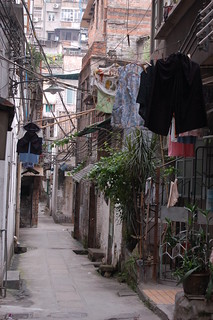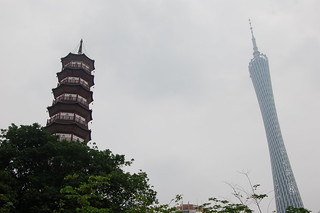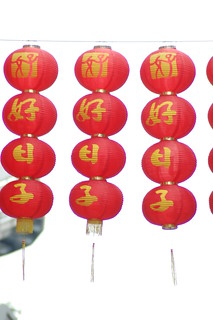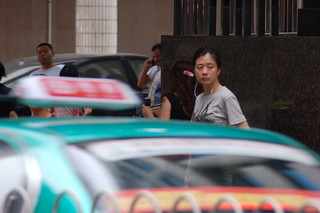It's okay, I have a good excuse as to why I haven't posted lately. The Chinese government censors certain sites on the internet, including Facebook, Twitter, and, of course, Blogspot. The owner of our hostel called it the Great Firewall of China, a phrase the locals use to denote the censorship.
Guangzhou's only a two hour train ride into the People's Republic of China, the full political name for the place that's considered the most populous country on the planet. It's the first city I've ever visited that's bigger than New York, at 11 million residents. The Metro system is chaotic, with everyone pushing and shoving to get on and off the train. The American rule of waiting until everyone gets off the train before getting on doesn't seem to exist.
On the street level, Guangzhou's pretty crazy as well. Bicycles, which are fading from the city's streets but still a popular means of transportation, carry heavy and bulky loads of cargo and sometimes two or three passengers. The entire time I was in Guangzhou, I did not see a single traffic light. There was only one walk/don't walk sign ("We have to take a picture," Rich said. "It's so rare.") Traffic seems to follow a set of mutually understood rules, but there are no visible signals to control cars on the streets. A bunch of new buildings line the streets, all very tall with lots of glass stretching into the thick layer of smog that coats the city.
Canton Tower is the single tallest thing I've ever seen. It's about 300 feet taller than the Empire State Building. When I got off the metro station by the tower, I couldn't immediately see the top. Not far from the new, enormous tower, however, was an old pagoda. It was one of the few pieces of old China I saw while I was there.
Guangzhou was called Canton during its period of British colonization. As the name implies, it's the heart of Cantonese cuisine. One morning, our hostel owner, Huang, took Rich and I to "drink morning tea," which is the literal translation for the Cantonese term for having breakfast. He ordered us porridge and dumplings, but Rich and I both agreed that the cakes were the best part of the meal. We sat at a round table with complete strangers who spoke Cantonese as we ate. Breakfast was delicious, but neither Rich nor I were adventurous enough to try pig's ears or chicken feet.
The most interesting part of Guangzhou was simply being white. According to Huang, most of the residents of the city are migrants from rural areas of the country, but there are very few immigrants from other parts of the world. It was extremely rare to see any non-Chinese people there, and Rich and I both frequently caught strangers staring in passing or on the Metro. One group of guys about our age even started talking to us in English as they passed on the escalator. It seemed as though people of our race were a rarity in Guangzhou. The stares and the hushed talk and glances by the locals were not so much unnerving as they were interesting. I'd imagine it's tough to live with such a thing on a daily basis, however, which really puts issues such as immigration and racism into perspective.
Guangzhou's only a two hour train ride into the People's Republic of China, the full political name for the place that's considered the most populous country on the planet. It's the first city I've ever visited that's bigger than New York, at 11 million residents. The Metro system is chaotic, with everyone pushing and shoving to get on and off the train. The American rule of waiting until everyone gets off the train before getting on doesn't seem to exist.
On the street level, Guangzhou's pretty crazy as well. Bicycles, which are fading from the city's streets but still a popular means of transportation, carry heavy and bulky loads of cargo and sometimes two or three passengers. The entire time I was in Guangzhou, I did not see a single traffic light. There was only one walk/don't walk sign ("We have to take a picture," Rich said. "It's so rare.") Traffic seems to follow a set of mutually understood rules, but there are no visible signals to control cars on the streets. A bunch of new buildings line the streets, all very tall with lots of glass stretching into the thick layer of smog that coats the city.
Canton Tower is the single tallest thing I've ever seen. It's about 300 feet taller than the Empire State Building. When I got off the metro station by the tower, I couldn't immediately see the top. Not far from the new, enormous tower, however, was an old pagoda. It was one of the few pieces of old China I saw while I was there.
Guangzhou was called Canton during its period of British colonization. As the name implies, it's the heart of Cantonese cuisine. One morning, our hostel owner, Huang, took Rich and I to "drink morning tea," which is the literal translation for the Cantonese term for having breakfast. He ordered us porridge and dumplings, but Rich and I both agreed that the cakes were the best part of the meal. We sat at a round table with complete strangers who spoke Cantonese as we ate. Breakfast was delicious, but neither Rich nor I were adventurous enough to try pig's ears or chicken feet.
The most interesting part of Guangzhou was simply being white. According to Huang, most of the residents of the city are migrants from rural areas of the country, but there are very few immigrants from other parts of the world. It was extremely rare to see any non-Chinese people there, and Rich and I both frequently caught strangers staring in passing or on the Metro. One group of guys about our age even started talking to us in English as they passed on the escalator. It seemed as though people of our race were a rarity in Guangzhou. The stares and the hushed talk and glances by the locals were not so much unnerving as they were interesting. I'd imagine it's tough to live with such a thing on a daily basis, however, which really puts issues such as immigration and racism into perspective.




No comments:
Post a Comment